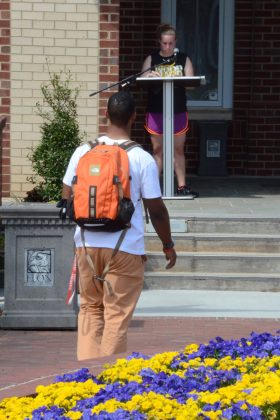Elon University is hosting several events from April 8-12 as part of its annual commemoration of the 6 million lives lost during the Holocaust.

And throughout the day on Monday, dozens of people from throughout the campus community made it a point that their names would not be forgotten.
Holocaust Remembrance Week at Elon University got underway April 8 with the “Reading of the Names,” which organizers described as a symbolic yet very personal way of remembering individuals.
In 10-minute intervals for a span of nine hours, students, faculty and staff took turns reading the names of just a small fraction of the 6 million people who died during World War II at the hands of the Nazis. The readings took place a microphone positioned just outside the main entrance to Moseley Center.
“We study history for a reason,” said Elon junior Diana Abrahams, an exercise science major from Boyds, Md., and vice president of Elon Hillel, “so that we don’t make the same mistakes and let this happen to other people.”
Congress established the Days of Remembrance as the nation’s annual commemoration of the Holocaust and Elon’s programs coincide with similar events at colleges and universities across the country.
“Hearing students, faculty and staff read names of those who perished in the Holocaust, stumbling over pronunciations, is very powerful,” said Hillel Director Nancy Luberoff. “The act of reading aloud is a way of publicly saying, ‘We remember you, we honor your life.’ Many of those whose names we read perished along with everyone in their family, so there are no relatives to remember their names or their lives.”
Campus programs this week include:
Monday, April 8, A PERSONAL EXPERIENCE OF THE KINDERTRANSPORT with DR. HENRY LANDSBERGER, 7-8 p.m., Yaeger Recital Hall: Landsberger survived the Holocaust as a part of the Kindertransport, a program that helped save the lives of 10,000 Jewish children from Germany by relocating them to safe foster homes, hostels and farms, albeit separated from their parents. He is UNC-Chapel Hill Professor Emeritus of Sociology.
Tuesday, April 9, HOLOCAUST EDUCATION TABLE, College Coffee: Volunteers will distribute ribbons representing different groups persecuted during the Holocaust, including people of color, people with physical or mental disabilities, Jews and the LGBT community.
Thursday, April 11, RE-CREATION OF THE OPERA Brundibár PERFORMED by NATALIE DUPUIS, 6-7 p.m., Yeager Recital Hall: The performance is part of Dupuis’ senior thesis. The children’s opera by Jewish Czech composer Hans Krása was originally performed by the children of Theresienstadt concentration camp in occupied Czechoslovakia.
Thursday, April 11, “THE FUTURE OF THE JEWS: HOW GLOBAL FORCES ARE IMPACTING THE JEWISH PEOPLE, ISRAEL, AND ITS RELATIONSHIP WITH THE UNITED STATES” WITH AMBASSADOR STUART EIZENSTAT, Lakeside Meeting Room (at Moseley Center), 7:30 p.m.: Eizenstat has held senior U.S. government positions in three presidential administrations and has been a leader in the Jewish community. He will share his provocative thesis regarding the future of the Jewish people in light of the major geopolitical, economic, and security challenges facing the world in general, and the United States and the State of Israel in particular.
Sponsored by the Lori and Eric Sklut Emerging Scholar in Jewish Studies Program, the Department of Political Science and Public Administration, Department of Religious Studies, Department of History and Geography, Middle East Studies, International Studies, Peace and Conflict Studies, Elon University School of Law, the Isabella Cannon Global Education Center, and the Truitt Center for Religious and Spiritual Life, with special thanks to the Office of the President.
Friday, April 12, COMMEMORATIVE KABBALAT SHABBAT, 5:15 – 5:45 p.m., Sklut Hillel Center
Throughout the week there will be an exhibit of Holocaust related books on display in Belk Library. Organizers also expressed gratitude to Maia Szulik for her support of this week’s activities through her Holocaust Education Fund.


